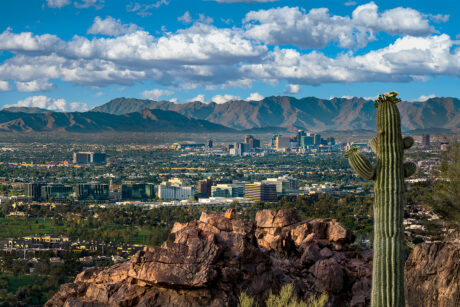By Kathryn M. Miller
Phoenix is an expansive, dynamic, rapidly growing city. In fact, Phoenix is not only the fifth largest city, it is the fastest growing major city in the U.S.
And in recent years, it has been feeling some major growing pains — from a shortage of affordable housing and increase in residents experiencing homelessness to an increase in narcotic offenses — which have many North Central residents looking for solutions to these and myriad other issues that come along with “big city” status.

Downtown Phoenix from 32nd and Lincoln. Courtesy VisitPhoenix.
“I think that what people are seeing are things that they haven’t seen in their communities before. There are areas that really have never been affected by some of the things that are happening,” said Lisa Huggins-Hubbard, Economic Development Program manager with the City of Phoenix Neighborhood Services Department (NSD).
Most of her 28 years with NSD has been as a neighborhood specialist in the central city core. She explained that the role of a neighborhood specialist is to be a liaison between residents and the city; to help neighborhoods and businesses find solutions to community issues. And one concern that is being raised more frequently is the increasing number of residents experiencing homelessness.
“A Maricopa County homeless census from October 2020 to 2021, showed more than 920 contacts with homeless individuals in that year in the area bounded by 16th Street to 35th Avenue, Camelback Road to Peoria,” shared John Hogeboom, president and CEO of Community Bridges, Inc. (CBI). “A similar census taken between January 2021 and the end of January 2022, showed 822 contacts with individuals experiencing homelessness occurring in the area between 12th Street and 35th Avenue from Glendale to Thunderbird.”
CBI (www.communitybridgesaz.org) is an integrated behavioral healthcare agency working in the Valley since 1982, most recently in the 19North community (Montebello Avenue, north to Dunlap Avenue, west to 23rd Avenue and east to 15th Avenue.) Their services include everything from crisis services to detox, outpatient medical care, housing and shelter services.
“We see a wide range of issues among those we connect with, including problems with addiction and behavioral health issues,” shared Hogeboom. “Among the common themes for those who end up homeless are family disputes, the loss of employment, medical conditions, mental health struggles and substance use issues. Often, these folks don’t have one problem; rather, it’s a perfect storm of issues that create an awful situation for them.”
Citing an increase in drug-related crimes, the 19North Community Alliance (www.19north.org) recently announced a 90-day pilot program with the goal of deterring crime in the area. The new Northern Avenue Safety Collaboration has three key aspects: hiring a private security firm to patrol businesses near 19th Avenue and Northern; displaying “resource” posters for those experiencing homelessness and addiction; and naming the community as “victim” in drug-related arrests/prosecution. [See the March 2022 issue of North Central News].
Not all residents agree with the direction that 19North is taking. Some residents fear that a “not in my backyard” mentality will push drugs and other crimes into surrounding, more depressed areas that cannot afford to hire private security firms. Others worry that the program is placing too much emphasis on prosecution rather than treatment.
To the second point, CBI, which is a partner in the collaboration, has set up a unique phone number to make it easier to track contacts related to this program and Hogeboom says they will continue to work in partnership with the City of Phoenix and area stakeholders.
Another solution CBI is developing is the North Mountain Healing Center, a 100-bed facility with a projected 2023 opening that Hogeboom said will allow CBI to do much more to help alleviate homelessness in the neighborhood.
“The shelter, which will feature a ‘closed campus’ to deter foot traffic in the area, and only take residents by referral, will give Phoenix Police and community organizations a comprehensive solution for individuals experiencing street homelessness in the area.”
But many residents ask, “What can we do as neighbors to keep areas safe and clean?”
Get involved, says Huggins-Hubbard. A key aspect of addressing some of the issues in neighborhoods is collaboration and engagement.
Individuals can find a wealth of resources available on the Neighborhood Services Department website (www.phoenix.gov/nsd). Search by address to find a neighborhood organization to join (or organize one of your own); sign up to volunteer to help remove graffiti or plant trees; or contact the neighborhood specialist assigned to your area to let them know about your specific issues.
Organized groups such as the Royal Palm Neighborhood, Hatcher Urban Business Alliance, East and West Sunnyslope Neighborhood Associations all work with the city to help them understand what is going on in individual neighborhoods. Huggins-Hubbard and NSD has worked with the 7th Avenue merchants in the Melrose District, businesses near 16th Street and Bethany Home, the Miracle Mile on McDowell and others to help revitalize their communities and create a sense of place.
“We’ve just had so many amazing neighborhood associations that every day are out there working. They’re not homeowner’s associations. These are just grassroots community people that care about their communities, volunteers, you know, that are out there every day, working to keep their neighborhoods safe and clean.”
She added, “I’ve found throughout my career it always works best when it’s community driven, and when the community works with the city to help identify what the issue is, as well as identify possible solutions, because those become those long-term sustainable outcomes.”
But it all starts with individuals getting involved and engaging in their community.
